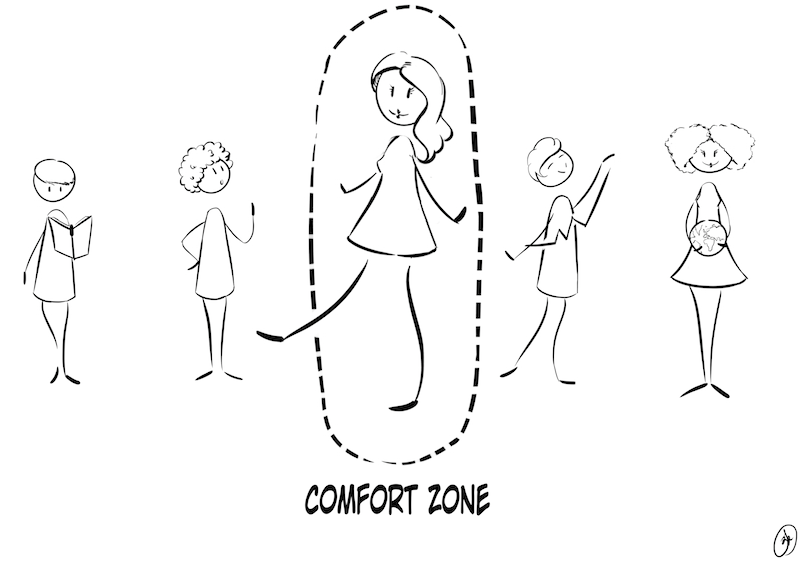Leaving our comfort zone
Contents

We leave our comfort zone when we get that anxious feeling in our chest and we are conscious that we’re not in control, and that something may go wrong.
Why is this so important?
Leaving our comfort zone makes us grow. It can be about having new responsibilities, doing something we’ve never done before, touching that part of the project we know nothing about, start leading people for the first time.
We may feel imposter syndrome and that we’re not up for the task. It will be worse based on the amount of people we’re communicating to. A typical example is doing a talk at a conference. Or even writing a blog post. We’re exposing ourselves and we don’t know how others will react. If they will like our work, or not.
It’s also worse on first times. The first time we’re leading some project and that feeling of having the ownership on our backs. Or the first time we are the interviewers on a recruiting process.
It can also be related with day to day tasks or interactions. For example, if we have someone that has an issue with a teammate, but lacks the soft skills to confront and solve it. Or when we need to say something to our manager/boss and we don’t know how.
As we can see, there are many ways for us to leave our comfort zone. I’d say that the most common would be to work on something that we don’t know much about.
Preparation for leaving the comfort zone
Whenever I get that feeling that I’m going out of my comfort zone, I stop and take some time to appreciate it. We may feel afraid of it, or not confident that we’ll make a blast. I try to switch the mindset and just be grateful. I try to see things not like a proof of worth, but rather as a test of my capabilities to adapt. If I fail, it’s all part of the learning process.
I just need to go from: “oh boy I have no idea of what I’m doing” to “ok, here’s a new challenge, let’s see how I handle it”. Less pressure, and more focus on continuous learning.
A personal example is this blog. I’m communicating my ideas and as such I’m subject to criticism. I may be writing things that are wrong or that I won’t stand by in a couple of years. But that’s okay. My end goal is to be a better writer, communicator and manager in 5 to 10 years. So everything wrong that I do today, it’s only preparation to be better in the long term.
It’s important to realize that we shouldn’t be accountable for doing things we know nothing about. If we’re going to do something very different that we’ve never done before, then we should have proper mentoring and training. If we don’t, we’ll need more time to learn and adapt and we should accept that.
Productivity versus comfort zone
One interesting side effect of leaving our comfort zone (and learning new things), is that our productivity will be hurt. When we’re most productive we know a lot about our craft, we have a clear picture of what’s ahead and what needs to be done. On the other hand, when we step on new grounds we’ll need time to adapt and learn. It’s all part of the process.
But the most important thing is that this is an investment. We may have a productivity bump, but we’re investing in being more valuable in the future.
So to make a team more productive, I believe we need to have a wave of leaving the comfort zone and another of productivity. This means that at some times we’re learning and investing on being better. And on other times we’re focusing on reaping our rewards and have a productivity boost.
Summary
I always try to come up with ideas that will make my teammates leave their comfort zone. On my 1on1s I track how much they feel that they’re leaving their comfort zone and if I see people accommodated I focus on changing that. Having people that are always comfortable is a bad sign. It means that we’re not in a challenging environment. And this may imply that the best people will leave and that we stay with a team that is filled with inertia. And we don’t want either.
Here’s the full list of indexes that I like to track on my 1on1s:
And you can also see how I bundle all this on my 1on1’s framework.
Discussion and references